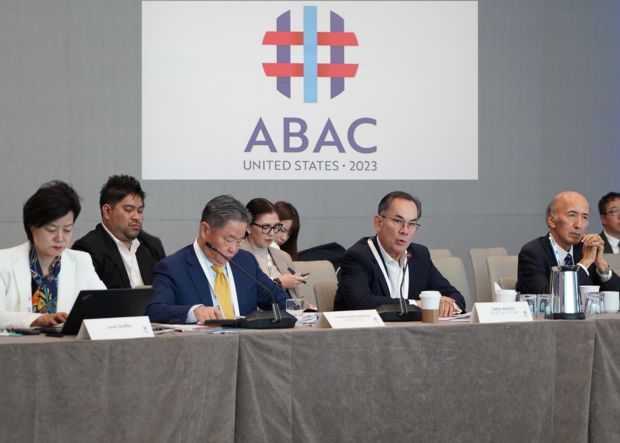ABAC Philippines drives climate action with innovative climate risk scenarios project
In a move aimed at addressing the pressing challenges of climate change, Sabin Aboitiz, President and CEO of the Aboitiz Group, ABAC Philippines member and ABAC SGWG Vice Chair, reports the progress on the Climate Risk Scenarios project. The progress report was presented during the APEC Business Advisory Council’s fourth meeting held in San Francisco, California, to translate climate awareness into actionable strategies.
The Climate Risk Scenarios project is designed to bridge the gap between climate awareness and proactive decision-making. The initiative comprises four crucial components, each addressing a key aspect of effective climate risk management: data accessibility, methodologies, policies, and capacity building.

Sabin Aboitiz, President and CEO of the Aboitiz Group and ABAC SGWG Vice Chair, reports the progress in the implementation of a Climate Risk Scenarios project. The progress report was presented during the APEC Business Advisory Council’s fourth meeting held in San Francisco, California.
One of the pivotal features of the project is the establishment of an online platform to facilitate seamless access to climate data. A standardized playbook was also proposed to provide guidance, while support for policy enhancement and a commitment to developing capabilities for climate risk management are integral aspects of the initiative.
In the initial phase of the project, Aboitiz highlighted the valuable insights gained from research and input of nine pilot economies. Similar and unique climate risks were identified, aiding in the prioritization of data on the platform. The assessments encompassed various aspects such as data and expertise, methodologies and standards, policies and mandates, and current practices in each economy, revealing gaps and strategies for improvement.
Aboitiz shared notable developments from the pilot economies, citing the National Autonomous University of Mexico’s use of climate data and socioeconomic factors to calculate climate change impacts. Thailand’s utilization of a climate analytics website for risk information and Canada’s rapid advancements in risk assessment capabilities were also highlighted. Moreover, both the Mexican and Philippine central banks were recognized for incorporating climate stress testing into their policy requirements.
The networks within ABAC members emerge as a pivotal force in fostering collaboration among data providers, users, and regulators. Stakeholders from diverse economies, including ABAC members in Australia, Japan, Indonesia, and Thailand, actively engage in the exchange of perspectives, emphasizing the indispensable role of collaboration in constructing climate resilience.
ADVT